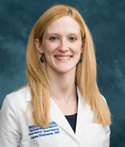Article:
Heidemann LA, Keilin CA, Santen SA, Fitzgerald JT, Zaidi NL, Whitman L, Morgan HK. Does Performance on Evidence-Based Medicine and Urgent Clinical Scenarios Assessments Deteriorate During the Fourth Year of Medical School? Findings From One Institution. Academic Medicine 2019;94(5):731–737. https://doi.org/10.1097/ACM.0000000000002583
Summary:
This paper examined the possibility of a decline in clinical skills during the 4th year of medical school. The authors evaluated performance on assessments of evidence-based medicine (EBM) and response to urgent clinical scenarios (UCS) for 4th year medical students at the University of Michigan. They found that performance on EBM declined over the course of the 4th year while performance on UCS remained stable. For this blog post, Avraham Cooper interviewed authors Lauren Heidemann and Helen Morgan.
Interview:
AC: You found that 4th year medical students experienced a decline in performance on evidence-based medicine (EBM) testing but performance on urgent clinical scenarios (UCS) did not decline.
How concerned are you that other skills or domains besides EBM are also declining during the 4th year?
LH and HM: We had an opportunity to examine this one domain (EBM) because we happened to have assessment data for our students, and we think that there are many other skills and domains that decline during the 4th year. Many students do not participate in meaningful clinical rotations during the final months immediately prior to residency.
AC: The majority of students experienced an increase in UCS scores (62%). Is this actually encouraging that clinical skills are not globally declining during the 4th year?
LH and HM: Yes, this was an interesting finding about the UCS scores. All of our students are required to complete an emergency medicine month during the 4th year, and this may explain the stable UCS scores. Unfortunately, we did not have enough data to examine how the M4 schedule impacted scores on UCS and EBM, though this would have been interesting.
AC: How much of an impact do you think the difference in testing format had on the results between EBM and UCS, with UCS tested via multiple choice and EBM via free text?
LH and HM: It is difficult to say whether the testing format made a difference versus test content. It is certainly possible that the phenomenon of the testing effect (i.e. cuing examinees to the correct answer based on previously encountering these questions) may have contributed to the improved performance with the UCS assessment, given that it was multiple choice. However, we are unable to draw any conclusions based on our data.
AC: Do you have any suggestions for interventions that medical schools could employ to better match 4th year curricula with “day one” residency competencies?
LH and HM: We know that there is ample literature that supports that our students are unprepared for residency, and we need to mobilize this time immediately prior to residency to capitalize on students’ intrinsic motivations to begin their careers as physicians as the best versions of themselves. So much of the medical school experience is distracted by extrinsic motivators, and the final phase of medical school should better prepare our students for the transition from medical student to resident. One intervention we have employed at our medical school is the creation of specialty-specific Residency Preparation Courses which review high-yield materials in the spring just prior to graduation. Students have given very positive feedback about these courses and are much more confident and prepared for residency after completion of the course. Further study is underway to look at the impact of these courses.

Blog post author
Avraham Cooper is Assistant Professor of Internal Medicine at The Ohio State University. He is the Assistant Program Director of the Pulmonary/Critical Care Fellowship and is an Associate Editor at the Journal of Graduate Medical Education. His academic interests focus on optimizing the learning environment and the pursuit of medical humanities.
Twitter handle: @AvrahamCooperMD

Article author
Helen Kang Morgan is Associate Professor of Obstetrics and Gynecology and Learning Health Sciences at the University of Michigan Medical School. Her scholarly focus has been on creating a competency-based continuum between medical school and residency, and on improving resident well-being.
Twitter handle: @helenjkmorgan

Article author
Lauren Heidemann is an Assistant Professor of Internal Medicine at University of Michigan Medical School. She is director of the Internal Medicine Residency Preparation Course and focuses on the transition between medical school and residency.
Twitter handle: @LHeidemann1



